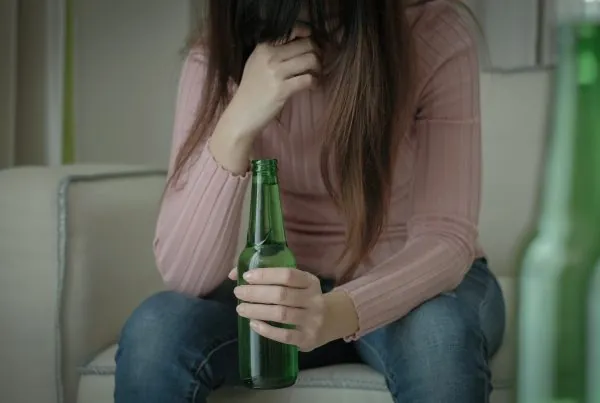While teen illicit drug use has been trending down over the years, underage drinking remains common. An estimated third of teens between the ages of 12 and 20 reported having had at least one drink in their lives. This includes about 32 percent of boys and 37 percent of girls. More troubling, however, is that over 8 percent – or about one in twelve teens – reported binge drinking in the last month alone.
While alcohol is estimated to be one of the most destructive drugs due to its ubiquity and one of the deadliest in terms of sheer casualties, drinking is a fact of life and a part of the culture for many.
Yet underage drinking poses unique risks for teens, especially with regard to their long-term mental health and cognition. More and more research is showing that early alcohol use heavily correlates with higher rates of drinking and alcoholism later in life, and teenage drinking – especially binge drinking – can take a toll on a teen’s mental and physical development.
Parents and teens alike may know that alcohol can be harmful and that moderation is always advised, but more awareness is needed on the topic of teen drinking, and its harmful consequences.
Underage Drinking Affects Brain Development
Alcohol is a potent psychoactive substance. It makes users feel dizzy and euphoric; but aside from these short-term effects, it also interferes with the brain’s centers of communication and cognition, impacting memory, decision-making, risk assessment, speech, and balance for a time.
However, these effects are especially potent in younger brains, which remain underdeveloped. Research shows that underage drinking can harm the developing brain, leading to lasting problems with memory, learning, and decision-making later in life.
The Risk of Alcohol Poisoning
In addition to generally being smaller than adults, teens are also more uninhibited, less likely to heed danger and weigh risk, and more likely to engage in risky behavior for social credit – which includes consuming much more alcohol than they should.
Binge drinking is more common among teens and younger adults than older people, and alcohol poisoning remains one of the most common causes of death for young teens. Brain damage is common in survivors of alcohol poisoning because it frequently involves choking or asphyxiation due to a delayed gag reflex and vomiting.
How Alcohol Affects Risk Assessment
Alcohol plays a significant role in reducing mental inhibition, which can help with “unwinding”, and feeling joy while drunk. But it also leads to a much greater risk of dangerous behavior, especially drunk driving. About a third of young drivers (15 to 20) who were killed in car crashes had ingested alcohol before driving. What’s worse is that about 5 percent of teen drivers were reportedly drunk while driving at least once in the past month alone.
In addition to car deaths, underage drinking is often associated with an increased risk of physical and sexual violence, suicide, homicide, burns, falls, drowning, unplanned or unwanted pregnancies, and the misuse of other substances while drunk.
Teens Are More Prone to Alcohol Addiction
Alcohol is an addictive substance. The prolonged and recurring use of alcohol can cause changes in the brain, devaluing other sources of motivation or pleasure, and causing physical withdrawal symptoms and cravings for alcohol.
However, what makes underage drinking particularly dangerous is that teen brains are naturally more prone to these changes. Teens get addicted to substances at a faster rate, and at a higher rate. Studies show that drinking at a young age can dramatically increase the risk of developing alcohol use disorder (AUD) later in life, versus avoiding alcohol until legal age.
The Legal Consequences of Underage Drinking
The immediate and long-term impact of underage drinking on brain development, risk of death, and addiction is meant to be reinforced by underage drinking laws, which prohibit the sale of alcohol to individuals under the age of 21 in the US, and severely limit the circumstances under which a person under that age might be allowed to drink, such as at home.
Underage drinking is illegal, and getting caught can result in legal problems, including jail time and hefty fines. Furthermore, driving while drunk and getting hurt can be a massive stain on a teen’s record – and a teen drunk driver may be found guilty of a felony if injuries or casualties are involved.
Underage Drinking, Depression, Anxiety, and Mental Health
The irony of alcohol is that it can temporarily alleviate feelings of anxiety, and even give the impression that it helps reduce depressive thoughts. But short-term drunkenness is overshadowed by the long-term impact of drinking, which includes a sharp increase in anxiety symptoms, worsened depressive symptoms, and a higher risk of developing other mental health issues, including trauma disorders or addiction.
The Physical Effects of Early Alcohol Use
In addition to affecting the brain, alcohol also affects the liver, kidneys, heart, and reproductive organs. Drinking at a young age can increase a teen’s risk of developing heart disease, a stroke, liver cirrhosis, or cancer, especially cancer of the throat and liver cancer.
Alcohol Abuse and School
The effects of continued alcohol use on a teen’s report cards are entirely negative. Memory and cognition problems can make it harder to focus on school subjects while the mental health toll adds further stress.
Alcoholism and Relationships
Alcohol use can lead to changes in personality, especially in the short term. Irritability and a shortened temper are some key symptoms of addiction, and withdrawal. Underage drinking may push away friends and family alike and make it harder to forge lasting bonds of friendship with others.
The Long-Term Impacts of Underage Drinking
We all grow up, one way or the other. Struggling with an addiction in your teen years can continue to become a burden well into later life. Legal troubles, academic problems, and a poor social reputation can make the transition into adulthood much harder for a young teen, limiting college acceptance changes and job opportunities, and negatively impacting valuable friendships, relationships, and acquaintances.
It’s no surprise that underage drinking is bad – but understanding the full extent to which it can affect a teen’s life may be important, to both teens and parents.
After all, parental influence remains stronger than peer influence, even for young adults living with their parents – and one of the most effective predictors of underage drinking is excessive alcohol use in the family. If alcohol use disorder runs in the family, being a strong role model can be a crucial protective factor for your teen.









